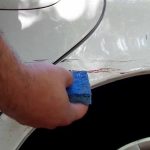Maintaining the lustrous exterior of your car is a task that often involves navigating a sea of cleaning products. Among them, mineral spirits stand out as a powerful solvent, raising the pivotal question: “Will mineral spirits damage car paint?” Let’s embark on a comprehensive journey to unravel the complexities surrounding this query and uncover the best practices to ensure your vehicle’s finish remains impeccable.
Understanding Mineral Spirits
Mineral spirits, derived from petroleum, serve as effective solvents for dissolving and removing various substances. Their versatility extends to cleaning car surfaces, making them a popular choice for tackling tough contaminants like grease, tar, and adhesive residues.
Factors Influencing Car Paint Reaction
The dynamic interaction between mineral spirits and car paint is influenced by several factors. A nuanced understanding of these elements is essential for anyone seeking to strike the right balance between cleanliness and preservation.
Will Mineral Spirits Harm Car Paint?
Addressing the primary concern head-on, the impact of mineral spirits on car paint is not a one-size-fits-all scenario. It hinges on variables such as the type of paint, its age, and the concentration of the solvent.
Types of Car Paint:
Clear coat finishes, prevalent in modern cars, are generally more resilient to mineral spirits. However, prolonged exposure may still lead to degradation. On the other hand, single-stage paints, commonly found on older vehicles, tend to be more susceptible to damage, demanding a more cautious approach.
Age of the Paint:
The age of your car’s paint is a critical factor. New paint jobs are more vulnerable and require a delicate touch during cleaning. In contrast, aged paint may withstand mineral spirits better due to its cured and hardened nature, but vigilance remains paramount.
Mineral Spirits Concentration:
The concentration of mineral spirits used plays a pivotal role. High concentrations pose a greater risk of damage, making dilution a prudent step. Following the manufacturer’s recommendations for dilution is crucial for maintaining a delicate balance between effectiveness and safety.
Safe Cleaning Practices
To navigate the delicate relationship between mineral spirits and car paint, adopting safe cleaning practices is paramount. Here are key guidelines to ensure your cleaning routine enhances, not jeopardizes, your car’s aesthetic appeal.
Patch Test:
Before embarking on a full-scale cleaning operation, perform a patch test on an inconspicuous area of your car. This preliminary assessment allows you to gauge how the paint reacts to the solvent, providing valuable insights into potential risks.
Dilution Guidelines:
If using concentrated mineral spirits, adhere to recommended dilution guidelines. Diluting the solvent appropriately mitigates the risk of damage, making it a safer option for various paint types.
Gentle Application:
The application method is as crucial as the choice of solvent. Use soft, non-abrasive materials such as microfiber cloths to apply mineral spirits. Avoid applying excessive pressure to prevent micro-scratches that can compromise the paint’s integrity.
Prompt Rinse:
After successfully cleaning with mineral spirits, promptly rinse the car surface with water. This step is critical to remove any residual solvent and prevent prolonged exposure, which could lead to unintended consequences.
Alternatives to Mineral Spirits
Considering the delicate nature of car paint, exploring alternative cleaning agents is a proactive approach. Here are some viable substitutes that offer effective cleaning without the potential risks associated with mineral spirits.
Waterless Car Wash Solutions:
Waterless car wash solutions have gained popularity for their eco-friendly nature and paint-safe formulation. These products leverage advanced chemistry to encapsulate and lift dirt from the surface without the need for harsh solvents. (See Also: Why is Chemical Guys Hated? Unveiling Common Grievances and Alternatives)
Automotive Detailing Sprays:
Specially formulated detailing sprays have become go-to options for car enthusiasts seeking a balanced cleaning solution. These sprays often incorporate gentle cleaning agents that effectively remove contaminants without compromising the paint.
Microfiber Towels:
In addition to choosing the right cleaning agent, the tools you use are equally vital. Microfiber towels, with their soft and absorbent characteristics, provide an ideal companion for cleaning your car. They minimize the risk of scratching and ensure a smooth cleaning process.
The Role of Protective Coatings
Investing in protective coatings for your car’s paint is a proactive measure to enhance resilience against potential damage. Ceramic coatings, for instance, form a durable, transparent layer over the paint, providing a shield against contaminants and UV rays.
Benefits of Protective Coatings:
- Enhanced Durability: Protective coatings create a robust barrier against environmental contaminants.
- UV Protection: They mitigate the damaging effects of UV rays, preventing paint oxidation and fading.
- Ease of Cleaning: Treated surfaces are easier to clean, reducing the reliance on aggressive solvents.
Expert Tips for Safely Using Mineral Spirits on Car Paint
Ensuring the longevity and luster of your car’s paint requires not just the right products but also the right techniques. When it comes to using mineral spirits, follow these expert tips for a safe and effective cleaning experience.
1. Dilution Precision:
Mineral spirits are potent, and their impact varies with concentration. Dilute the solvent according to manufacturer guidelines to strike the perfect balance between efficacy and paint protection.
2. Gentle Pressure Wins:
When applying mineral spirits, resist the urge to exert excessive pressure. Opt for a gentle touch to avoid micro-scratches that could compromise the integrity of your car’s paint.
3. Strategic Application:
Identify and target specific areas that require cleaning rather than applying mineral spirits across the entire surface. This focused approach minimizes unnecessary exposure and potential risks.
4. Swift and Thorough Rinsing:
After the cleaning process, promptly rinse your car with water to eliminate any lingering traces of mineral spirits. Swift action mitigates the risk of prolonged exposure and its potential consequences.
5. Choose the Right Tools:
Select soft, non-abrasive tools such as microfiber cloths for application. The right tools complement the cleaning agent, ensuring a smooth and safe interaction with your car’s paint.
6. Patch Test Precaution:
Before initiating a full cleaning session, perform a patch test on an inconspicuous area. This precautionary step helps you gauge how your car’s paint reacts to the solvent, allowing you to make informed decisions.
7. Timing Matters:
Avoid cleaning your car in direct sunlight or extreme temperatures. Optimal cleaning conditions contribute to a more controlled and effective application of mineral spirits.
8. Regular Protective Coating:
Consider investing in regular protective coatings like ceramic coatings. These coatings act as an additional layer, fortifying your car’s paint against contaminants and UV rays. (See Also: Will Lacquer Thinner Damage Car Paint? Tips to Safely Remove Paint and Avoid Damage)
9. Explore Waterless Options:
For a safer and environmentally friendly alternative, explore waterless car wash solutions. These products offer effective cleaning without the need for harsh solvents.
10. Prioritize Regular Maintenance:
Consistent and gentle maintenance trumps aggressive cleaning. Regularly attend to your car’s cleanliness to minimize the need for potent solvents and ensure a lasting shine.
11. Consult Professional Detailers:
When in doubt or dealing with specific paint types, seek advice from professional detailers. Their expertise can provide tailored recommendations for your car’s unique needs.
12. Monitor Paint Health:
Keep a vigilant eye on your car’s paint health. Any signs of deterioration or unusual reactions should prompt a reassessment of your cleaning methods.
13. Environmentally Conscious Disposal:
Dispose of used mineral spirits responsibly. Follow local regulations and opt for environmentally conscious disposal methods to minimize ecological impact.
14. Balance Efficiency and Caution:
Striking a balance between efficiency and caution is key. Tailor your cleaning approach to the specific requirements of your car, considering its age, paint type, and overall condition.
15. Educate Yourself Continuously:
Stay informed about advancements in car care and cleaning techniques. Continuous education ensures that your approach evolves with the industry, providing the best care for your vehicle.
Implementing these expert tips transforms the use of mineral spirits from a potential risk to a refined and effective cleaning practice. Preserve your car’s paint with confidence, knowing that you’ve adopted the best practices in the realm of automotive care.
Frequently Asked Questions About Using Mineral Spirits on Car Paint
As car enthusiasts and owners seek effective ways to maintain their vehicles, questions often arise about the use of mineral spirits on car paint. Let’s address these frequently asked questions to ensure a clear understanding of the nuances involved.
Q1: Can mineral spirits damage my car’s paint?
A: The impact of mineral spirits on car paint depends on factors like paint type, age, and concentration. When used cautiously and following best practices, mineral spirits can be safe, but understanding your paint’s characteristics is crucial.
Q2: How do I dilute mineral spirits for safe use?
A: Dilute mineral spirits according to the manufacturer’s guidelines. This ensures effective cleaning while minimizing the risk of damage. High concentrations can be harsh, so precision in dilution is essential.
Q3: Is there a risk of scratching the paint when using mineral spirits?
A: Excessive pressure during application can lead to micro-scratches. To avoid this, use gentle pressure and soft, non-abrasive materials such as microfiber cloths.
Q4: Should I apply mineral spirits to the entire car or specific areas?
A: Target specific areas that require cleaning rather than applying mineral spirits across the entire surface. This focused approach minimizes unnecessary exposure and potential risks. (See Also: What Can I Use to Clean Chrome Rims Effectively: Chrome Rim Care 101)
Q5: Can I use mineral spirits on any type of car paint?
A: Clear coat finishes are generally more resilient, while single-stage paints require a more cautious approach. Always perform a patch test on an inconspicuous area to gauge compatibility.
Q6: How often should I clean my car with mineral spirits?
A: Regular, gentle maintenance is more effective than aggressive cleaning. The frequency depends on your driving conditions, but avoid excessive cleaning to preserve your car’s paint.
Q7: Are there alternatives to mineral spirits for cleaning car paint?
A: Yes, waterless car wash solutions and automotive detailing sprays are viable alternatives. They offer effective cleaning without the potential risks associated with mineral spirits.
Q8: Can protective coatings help prevent damage from mineral spirits?
A: Yes, investing in protective coatings like ceramic coatings adds a durable layer to your car’s paint, providing additional defense against contaminants and UV rays.
Q9: What precautions should I take when cleaning my car with mineral spirits?
A: Perform a patch test, use gentle pressure, and promptly rinse the car after cleaning. Avoid cleaning in direct sunlight or extreme temperatures, and follow all safety guidelines.
Q10: Is it necessary to consult professional detailers for advice?
A: When in doubt or dealing with specific paint types, seeking advice from professional detailers is a prudent step. Their expertise can offer tailored recommendations.
Navigating the world of car care, especially when it involves solvents like mineral spirits, requires clarity. These FAQs aim to provide answers to common concerns, empowering car owners to make informed decisions when it comes to preserving their vehicle’s paint.
Conclusion: Nurturing Your Car’s Elegance
In the ever-evolving landscape of car care, the question of whether mineral spirits will damage car paint underscores the importance of informed decision-making. By comprehensively understanding the nuances and adopting safe cleaning practices, you can embark on a journey to preserve, rather than jeopardize, your vehicle’s elegance.
So, will mineral spirits damage car paint? The answer lies not in avoidance but in a balanced and informed approach. With a careful selection of cleaning agents, conscientious application techniques, and, when needed, the added protection of coatings, you can ensure that your car maintains its aesthetic allure for years to come. Choose wisely, clean responsibly, and let your vehicle shine with enduring brilliance.



